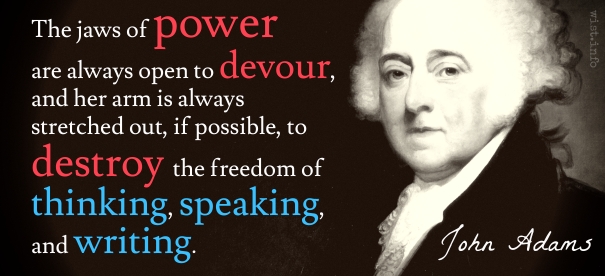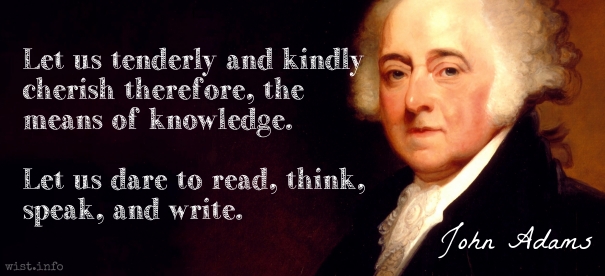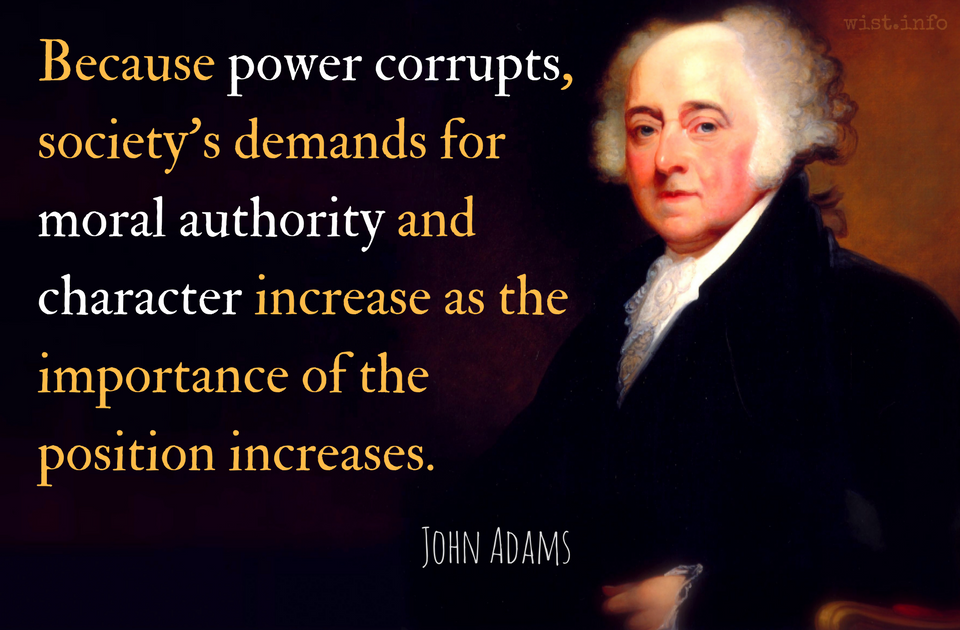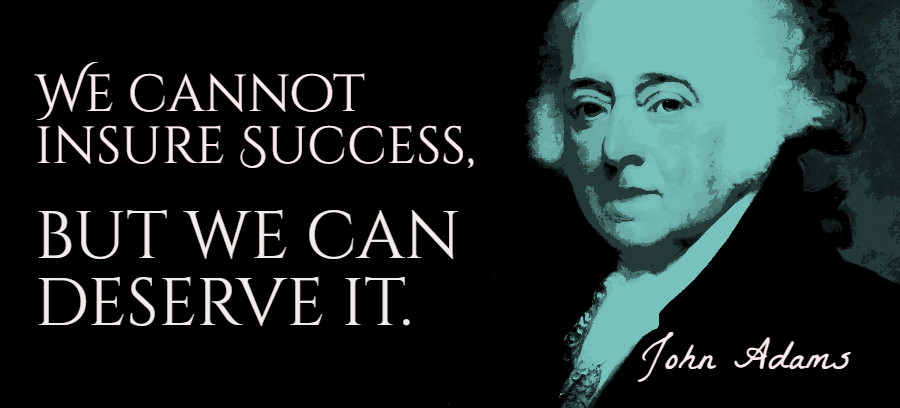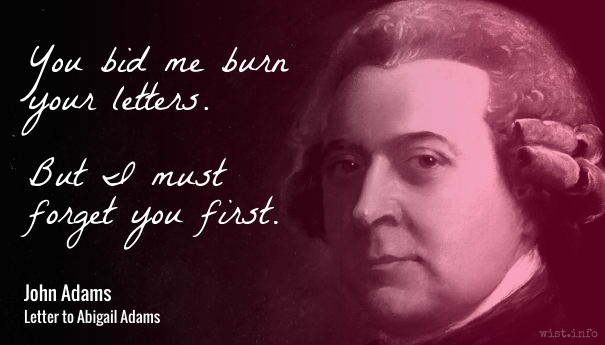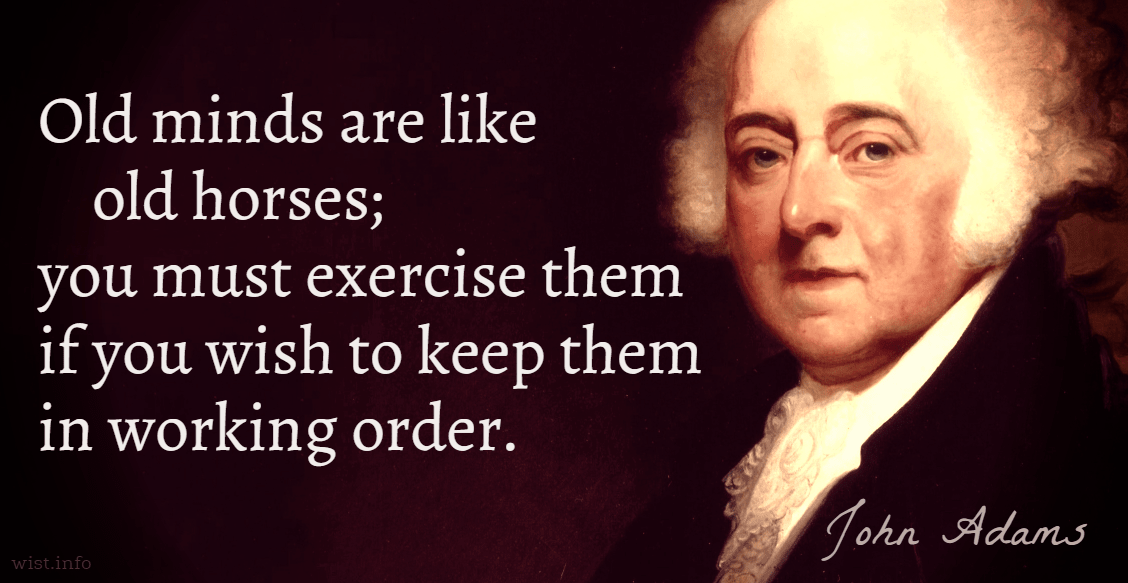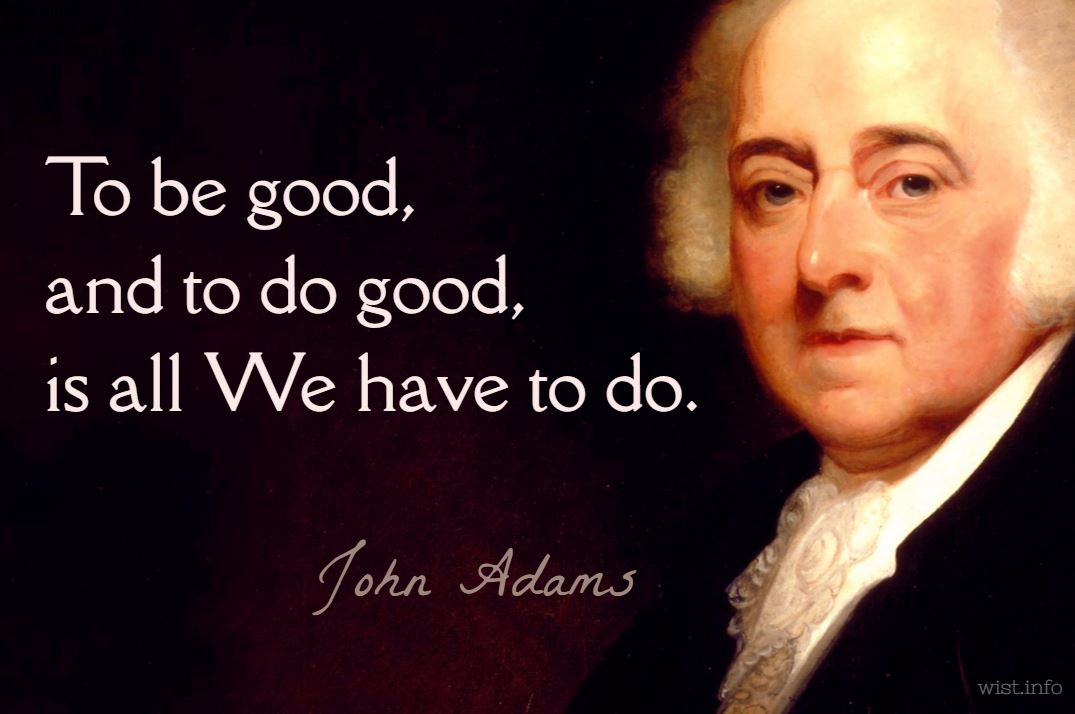The United States of America have exhibited, perhaps, the first example of governments erected on the simple principles of nature; and if men are now sufficiently enlightened to disabuse themselves of artifice, imposture, hypocrisy, and superstition, they will consider this event as an era in their history. Although the detail of the formation of the American governments is at present little known or regarded either in Europe or in America, it may hereafter become an object of curiosity. It will never be pretended that any persons employed in that service had interviews with the gods, or were in any degree under the influence of Heaven, more than those at work upon ships or houses, or laboring in merchandise or agriculture; it will forever be acknowledged that these governments were contrived merely by the use of reason and the senses.
Quotations by:
Adams, John
The jaws of power are always open to devour, and her arm is always stretched out, if possible, to destroy the freedom of thinking, speaking, and writing.
John Adams (1735-1826) American lawyer, Founding Father, statesman, US President (1797-1801)
“A Dissertation on the Canon and Feudal Law” (1765)
(Source)
Let us tenderly and kindly cherish, therefore, the means of knowledge. Let us dare to read, think, speak and write.
John Adams (1735-1826) American lawyer, Founding Father, statesman, US President (1797-1801)
“A Dissertation on the Canon and the Feudal Law” No. 4, Boston Gazette (1765-10-21)
(Source)
Facts are stubborn things; and whatever may be our wishes, our inclinations, or the dictates of our passions, they cannot alter the state of the facts and evidence.
The law no passion can disturb. ‘Tis void of desire and fear, lust and anger. ‘Tis mens sine affectu, written reason, retaining some measure of the divine perfection. It does not enjoin that which pleases a weak, frail man, but, without any regard to persons, commands that which is good and punishes evil in all, whether rich or poor, high or low.
The law, in all vicissitudes of government … will preserve a steady undeviating course; it will not bend to the uncertain wishes, imaginations, and wanton tempers of men. … On the one hand it is inexorable to the cries of the prisoners; on the other it is deaf, deaf as an adder to the clamours of the populace.
A desire to be observed, considered, esteemed, praised, beloved, and admired by his fellows is one of the earliest, as well as the keenest dispositions discovered in the heart of man.
Metaphysicians and politicians may dispute forever, but they will never find any other moral principle or foundation of rule or obedience, than the consent of governors and governed.
A government of laws, and not of men.
John Adams (1735-1826) American lawyer, Founding Father, statesman, US President (1797-1801)
“Novanglus” #7, Boston Gazette (6 Mar 1775)
Adams credited the line to James Harrington (1611-77), who wrote of "the empire of laws and not of men" (The Commonwealth of Oceana (1656)). Adams later used the term in the Massachusetts Constitution, Bill of Rights, article 30 (1780).
We ought to consider what is the end of government before we determine which is the best form. Upon this point all speculative politicians will agree that the happiness of society is the end of government, as all divines and moral philosophers will agree that the happiness of the individual is the end of man. From this principle it will follow that the form of government which communicates ease, comfort, security, or, in one word, happiness, to the greatest number of persons, and in the greatest degree, is the best.
John Adams (1735-1826) American lawyer, Founding Father, statesman, US President (1797-1801)
“Thoughts on Government,” letter to George Wythe (Jan 1776)
(Source)
Laws for the liberal education of youth, especially of the lower class of people, are so extremely wise and useful, that, to a humane and generous mind, no expense for this purpose would be thought extravagant.
John Adams (1735-1826) American lawyer, Founding Father, statesman, US President (1797-1801)
“Thoughts on Government” (Apr 1776)
(Source)
Mankind is naturally divided into three sorts; one third of them are animated at the first appearance of danger, and will press forward to meet and examine it; another third are alarmed by it, but will neither advance nor retreat, till they know the nature of it, but stand to meet it. The remaining third will run or fly upon the first thought of it.
It is more important that innocence be protected than it is that guilt be punished, for guilt and crimes are so frequent in this world that they cannot all be punished. But if innocence itself is brought to the bar and condemned, perhaps to die, then the citizen will say, “whether I do good or whether I do evil is immaterial, for innocence itself is no protection,” and if such an idea as that were to take hold in the mind of the citizen that would be the end of security whatsoever.
John Adams (1735-1826) American lawyer, Founding Father, statesman, US President (1797-1801)
(Attributed)
Cited in some cases as the closing argument while defending the British Soldiers accused of killing 5 colonists in the "Boston Massacre" (usually given as "Argument in Defense of the Soldiers in the Boston Massacre Trials" (Dec 1770)), but I did not find it in accounts of that defense.
There are obviously two educations. One should teach us how to make a living and the other how to live.
John Adams (1735-1826) American lawyer, Founding Father, statesman, US President (1797-1801)
(Misattributed)
Actually American writer and historian James Truslow Adams (1878-1949). Variants:
- "There are two types of education. One should teach us how to make a living, and the other how to live."
- "There are two educations. One should teach us how to make a living and the other how to live."
It must be made a sacred maxim, that the militia obey the executive power, which represents the whole people in the execution of laws. To suppose arms in the hands of citizens, to be used at the individual discretion, except in private self-defence, or by partial orders of towns, counties, or districts of a state, is to demolish every constitution, and lay the laws prostrate, so that liberty can be enjoyed by no man; it is a dissolution of the government. The fundamental law of the militia is, that it be created, directed and commanded by the laws, and ever for the support of the laws.
Liberty cannot be preserved without a general knowledge among the people, who have a right, from the frame of their nature, to knowledge, as their great Creator, who does nothing in vain, has given them understandings, and a desire to know; but besides this, they have a right, an indisputable, unalienable, indefeasible, divine right to that most dreaded and envied kind of knowledge, I mean, of the characters and conduct of their rulers.
John Adams (1735-1826) American lawyer, Founding Father, statesman, US President (1797-1801)
A Dissertation on the Canon and Feudal Law (1765)
(Source)
Paraphrase: "The people have a right, an indisputable, unalienable, indefeasible, divine right to that most dreaded and envied kind of knowledge -- I mean of the character and conduct of their rulers."
The desire of the esteem of others is as real a want of nature as hunger — and the neglect and contempt of the world as severe a pain as the gout or stone.
John Adams (1735-1826) American lawyer, Founding Father, statesman, US President (1797-1801)
Discourses on Davila (1790)
Full text.
The poor man’s conscience is clear; yet he is ashamed. … He feels himself out of the sight of others, groping in the dark. Mankind takes no notice of him: he rambles and wanders unheeded. In the midst of a crowd, at church, in the market … he is in as much obscurity as he would be in a garret or a cellar. He is not disapproved, censured, or reproached: he is only not seen. … To be wholly overlooked, and to know it, are intolerable.
I must judge for myself, but how can I judge, how can any Man judge, unless his Mind has been opened and enlarged by Reading.
John Adams (1735-1826) American lawyer, Founding Father, statesman, US President (1797-1801)
Diary (1761-08-01)
(Source)
The Stream of Life sometimes glides smoothly on, through flowry meadows and enamell’d planes. At other times it draggs a winding reluctant Course through offensive Boggs and dismal gloomy Swamps. The same road now leads us thro’ a spacious Country fraught with evry delightful object, Then plunges us at once, into miry Sloughs, or stops our passage with craggy and inaccessible mountains. The free roving Songster of the forest, now rambles unconfin’d, and hopps from Spray to Spray but the next hour perhaps he alights to pick the scattered Grain and is entangled in the Snare. The Ship, which, wafted by a favourable gale, sails prosperously upon the peaceful Surface, by a sudden Change of weather may be tossed by the Tempest, and driven by furious, opposite winds, upon rocks or quicksands. In short nothing in this world enjoys a constant Series of Joy and prosperity.
Cities may be rebuilt, and a People reduced to Poverty, may acquire fresh Property: but a Constitution of Government once changed from Freedom, can never be restored. Liberty, once lost, is lost forever.
Education makes a greater difference between man and man, than nature has made between man and brute. The virtues and powers to which men may be trained, by early education and constant discipline, are truly sublime and astonishing. Newton and Locke are examples of the deep sagacity which may be acquired by long habits of thinking and study.
John Adams (1735-1826) American lawyer, Founding Father, statesman, US President (1797-1801)
Letter to Abigail Adams (1775-10-29)
(Source)
I am well aware of the Toil and Blood and Treasure, that it will cost Us to maintain this Declaration, and support and defend these States. — Yet through all the Gloom I can see the Rays of ravishing Light and Glory. I can see that the End is more than worth all the Means. And that Posterity will tryumph in that Days Transaction, even altho We should rue it, which I trust in God We shall not.
John Adams (1735-1826) American lawyer, Founding Father, statesman, US President (1797-1801)
Letter to Abigail Adams (1776-07-03)
(Source)
The Second Day of July 1776, will be the most memorable Epocha, in the History of America. — I am apt to believe that it will be celebrated, by succeeding Generations, as the great anniversary Festival. It ought to be commemorated, as the Day of Deliverance by solemn Acts of Devotion to God Almighty. It ought to be solemnized with Pomp and Parade, with Shews, Games, Sports, Guns, Bells, Bonfires and Illuminations from one End of this Continent to the other from this Time forward forever more.
John Adams (1735-1826) American lawyer, Founding Father, statesman, US President (1797-1801)
Letter to Abigail Adams (1776-07-03)
(Source)
The Colonial Congress approved of the Independence Resolution on 2 July. The final agreement on the Declaration, and its signing, was on 4 July.
I must study Politicks and War that my sons may have liberty to study Mathematicks and Philosophy. My sons ought to study Mathematicks and Philosophy, Geography, natural History, Naval Architecture, navigation, Commerce and Agriculture, in order to give their Children a right to study Painting, Poetry, Musick, Architecture, Statuary, Tapestry and Porcelaine.
John Adams (1735-1826) American lawyer, Founding Father, statesman, US President (1797-1801)
Letter to Abigail Adams (1780-05-12 to 15)
(Source)
Posterity! You will never know, how much it cost the present Generation, to preserve your Freedom! I hope you will make a good Use of it. If you do not, I shall repent in Heaven, that I ever took half the Pains to preserve it.
John Adams (1735-1826) American lawyer, Founding Father, statesman, US President (1797-1801)
Letter to Abigail Adams (26 Apr 1777)
(Source)
We should begin by setting conscience free. When all men of all religions shall enjoy equal liberty, property, and an equal chance for honors and power we may expect that improvements will be made in the human character and the state of society.
But how has it happened that millions of fables, tales, legends have been blended with both Jewish and Christian revelation that have made them the most bloody religion that ever existed?
The Revolution was affected before the war commenced. The Revolution was in the minds and hearts of the people …. This radical change in the principles, opinions, sentiments, and affections of the people was the real American Revolution.
Abuse of words has been the great instrument of sophistry and chicanery, of party, faction, and division of society.
John Adams (1735-1826) American lawyer, Founding Father, statesman, US President (1797-1801)
Letter to J. H. Tiffany (31 Mar 1819)
(Source)
The Whole People must take upon themselvs the Education of the Whole People and must be willing to bear the expences of it. There should not be a district of one Mile Square without a school in it, not founded by a Charitable individual but maintained at the expence of the People themselvs.
John Adams (1735-1826) American lawyer, Founding Father, statesman, US President (1797-1801)
Letter to John Jebb (1785-09-10)
(Source)
What havoc has been made of Books through every Century of the Christian Æra? Where are fifty Gospells condemned as spurious by the Bull of Pope Gelasius. Where are the forty Waggon Loads of Hebrew Manuscripts burned in France by order of another Pope, because suspected of Heresy? Remember the Index expurgatorius, the Inquisitions, the Stake, the Axe the halter and the Guillotine; and Oh! horrible the Rack. This is as bad if not worse than a slow fire.
John Adams (1735-1826) American lawyer, Founding Father, statesman, US President (1797-1801)
Letter to John Taylor (14 Dec 1814)
(Source)
I do not say that Democracy has been more pernicious, on the whole, and in the long run, than Monarchy or Aristocracy. Democracy has never been and never can be so durable as Aristocracy or Monarchy. But while it lasts it is more bloody than either. […] Remember Democracy never lasts long. It soon wastes exhausts and murders itself. There never was a Democracy Yet, that did not commit suicide.
John Adams (1735-1826) American lawyer, Founding Father, statesman, US President (1797-1801)
Letter to John Taylor (17 Dec 1814)
(Source)
It is in vain to Say that Democracy is less vain, less proud, less selfish, less ambitious or less avaricious than Aristocracy or Monarchy. It is not true in Fact and no where appears in history. Those Passions are the same in all Men under all forms of Simple Government, and when unchecked, produce the same Effects of Fraud Violence and Cruelty. When clear Prospects are opened before Vanity, Pride, Avarice or Ambition, for their easy gratification, it is hard for the most considerate Phylosophers and the most conscientious Moralists to resist the temptation. Individuals have conquered themselves, Nations and large Bodies of Men, never.
John Adams (1735-1826) American lawyer, Founding Father, statesman, US President (1797-1801)
Letter to John Taylor (17 Dec 1814)
(Source)
The Priesthood, have in all ancient Nations, nearly monopolized Learning. Read over again all the Accounts We have of Hindoos, Chaldeans, Persians Greeks, Romans, Celts, Teutons, We Shall find that Priests had all the Knowledge, and really governed all Mankind. Examine Mahometanism. Trace Christianity from its first Promulgation, Knowledge has been almost exclusively confined to the Clergy. And even since the Reformation, when or where has existed a Protestant or dissenting Sect, who would tolerate, A free Inquiry? The blackest Billingate, the most ungentlemanly insolence, the most yahooish brutality, is patiently endured countenanced propagated and applauded: But touch a solemn Truth in collission with a dogma of a Sect, though capable of the clearest proof; and you will Soon find you have disturbed a Nest, and the hornets will swarm about your legs and hands and fly into your face and Eyes.
There is nothing which I dread so much as a division of the republic into two great parties, each arranged under its leader, and concerting measures in opposition to each other. This, in my humble apprehension, it to be dreaded as the greatest political evil under our Constitution.
Public virtue cannot exist in a nation without private, and public virtue is the only foundation of republics. There must be a positive passion for the public good, the public interest, honour, power and glory, established in the minds of the people, or there can be no republican government, nor any real liberty: and this public passion must be superior to all private passions.
Virtue and Simplicity of Manners are indispensably necessary in a Republic among all orders and Degrees of Men. But there is so much Rascallity, so much Venality and Corruption, so much Avarice and Ambition such a Rage for Profit and Commerce among all Ranks and Degrees of Men even in America, that I sometimes doubt whether there is public Virtue enough to Support a Republic.
John Adams (1735-1826) American lawyer, Founding Father, statesman, US President (1797-1801)
Letter to Mercy Warren (8 Jan 1776)
Full text.
The fundamental article of my political creed is that despotism, or unlimited sovereignty, or absolute power, is the same in a majority of a popular assembly, an aristocratic council, an oligarchical junto, and a single emperor.
Power always Sincerely, conscientiously, de très bon foi, believes itself Right. Power always thinks it has a great Soul and vast Views, beyond the Comprehension of the Weak; and that it is doing God Service when it is violating all his Laws.
John Adams (1735-1826) American lawyer, Founding Father, statesman, US President (1797-1801)
Letter to Thomas Jefferson (2 Feb 1816)
(Source)
de très bon foi = "very candidly"
Our Passions, Ambition, Avarice, Love, Resentment &c possess so much metaphysical Subtilty and so much overpowering Eloquence, that they insinuate themselves into the Understanding and the Conscience and convert both to their Party. And I may be deceived as much as any of them, when I Say, that Power must never be trusted without a Check.
John Adams (1735-1826) American lawyer, Founding Father, statesman, US President (1797-1801)
Letter to Thomas Jefferson (2 Feb 1816)
(Source)
Books that cannot bear examination, certainly ought not to be established as divine inspiration by penal laws.
John Adams (1735-1826) American lawyer, Founding Father, statesman, US President (1797-1801)
Letter to Thomas Jefferson (23 Jan 1825)
(Source)
As to the history of the revolution, my ideas may be peculiar, perhaps singular. What do we mean by the revolution? The war? That was no part of the revolution; it was only an effect and consequence of it. The revolution was in the minds of the people, and this was effected from 1760 to 1775, in the course of fifteen years, before a drop of blood was shed at Lexington.
We have now, it seems a National Bible Society, to propagate King James Bible, through all Nations. Would it not be better, to apply these pious Subscriptions, to purify Christendom from the corruptions of Christianity; than to propagate those Corruptions in Europe, Asia, Africa and America!
John Adams (1735-1826) American lawyer, Founding Father, statesman, US President (1797-1801)
Letter to Thomas Jefferson (4 Nov 1816)
(Source)
After the founding of the American Bible Society (11 May 1816).
As the happiness of the people is the sole end of government, so the consent of the people is the only foundation of it, in reason, morality, and the natural fitness of things.


